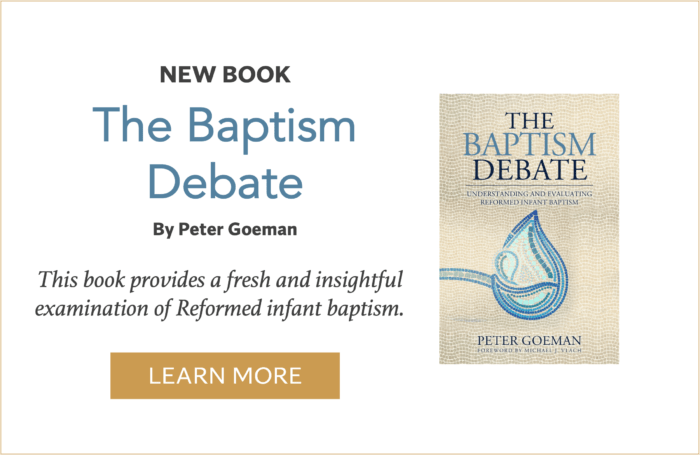Zwingli’s Separation of Faith from Baptism
Prior to the Reformation, faith was always associated with baptism. This obviously raised issues for infant baptism, since it is difficult to see how infants can exercise faith. To deal with this difficulty, Augustine taught the concept of fides aliena, an alien faith that belonged to others was applied on behalf of the infant. Usually, this was the parent’s faith, but sometimes the church’s. However, many theologians viewed this as an unsatisfactory answer. So, the Catholic church developed the idea of fides infusa baptisme, faith or power which was “infused” to the infant through baptism.
It was into the world of fides aliena and fides infusa that Martin Luther was born. Although Luther broke away from the Roman Catholic church in many key areas (one such area being justification by faith alone),[1] he largely embraced Rome’s view of infant baptism. One major difference was that Luther saw no problem with an infant having his or her own faith. In the early 1520s Luther wrote in defense of infant baptism with the concrete statement, “The infants themselves believe in baptism, and have their own faith.”[2] In defending this idea to the Bohemian Brethren, Luther pointed to the baptismal liturgy, where the baptizer asks whether the infant believes. In the liturgy, the sponsor answers in the affirmative, and Luther makes the point that if the child doesn’t really believe, then the answer would be a lie.[3] Thus, for Luther, it was important to acknowledge that the child really was expressing faith at the time of baptism.

Zwingli and the Anabaptists
Historians generally acknowledge much of Luther’s baptismal theology was formulated in response to the Anabaptists, that pesky movement that challenged the status quo of infant baptism. Similarly, in Zurich, Ulrich Zwingli found himself repeatedly engaging with the Anabaptist movement.
Zwingli apparently started out as an ally of the Anabaptist movement.[4] According to Blaurock, a contemporary of Zwingli, one of the reasons Zwingli did not continue to support the Anabaptist view was because he did not want an uprising to break out among the people.[5] Exactly how strongly Zwingli entertained the Anabaptist position is debated, but ultimately, he became one of the staunchest opponents of the Anabaptists.[6]
Zwingli and Covenant Theology Baptism
Zwingli has historically been viewed as the founder of Reformed covenant theology.[7] It was largely in response to the Anabaptists that Zwingli formulated his covenant theology so clearly.[8] Interestingly enough, when Zwingli first wrote in defense of infant baptism, he avoided reference to covenantal theology or the continuity between the testaments.[9] However, with the increased pressure from the Anabaptists, Zwingli was compelled to utilize new argumentation. In so doing, Zwingli departed from the normal paedobaptist arguments and embraced a different kind of argumentation. Zwingli himself realized he was employing a new understanding of baptism. He writes in de Baptismo,
In this matter of baptism—if I may be pardoned for saying it—I can only conclude that all the doctors have been in error from the time of the apostles. This is a serious and weighty assertion, and I make it with such reluctance that had I not been compelled to do so by contentious spirits, I would have preferred to keep silence. … At many points we shall have to read a different path from that taken either by ancient or more modern writers or by our own contemporaries.[10]
What was this new form of argument—the argumentation which took a different path from ancient or modern writers? It was the divorce between the material and the spiritual. Specifically, in the case of baptism, baptism (as the material, external) was separated from faith (as the spiritual, internal). In other words, “Zwingli did what nobody had yet done: he severed baptism from faith.”[11]
Zwingli argued that both papists and Anabaptists put too much emphasis on baptism, which was to be viewed as a mere external rite.[12] In order to account for biblical passages which linked faith and baptism, Zwingli would often interpret the reference to baptism as a figurative saying—symbolic of faith.[13]
What Zwingli achieved was a marvelously clever and persuasive way to reject the suspicious devices of previous paedobaptist argumentation, fides aliena, fides infusa, fides infantium [faith of the infant], and the like, and at the same time to maintain infant baptism against the Anabaptists. But this solution had as its price the integrity of Zwingli’s exegesis of the baptismal passages of the NT and the very significance of baptism itself. For if baptism is a mere external thing, disconnected from salvation, why practice it at all?[14]
Having divorced faith from baptism, Zwingli employed a revolutionary argument for paedobaptism against the Anabaptists.[15] He argued for a unified covenant between the Old and New Testaments, into which children were granted entrance through baptism. Although quite revolutionary at the time, this form of argumentation for paedobaptism has become dominant in the Reformed churches. The connection between faith and baptism has been severely strained, and in some cases, completely separated. In its place, a unified, singular covenant has become the central argument in the Reformed camp for paedobaptism.
Zwingli changed the way protestants talk about infant baptism. And, I think due to Zwingli’s work, a question has been set aside that should never have been set aside. I believe it is the foundational question to the whole discussion of infant baptism—what is the relationship between faith and baptism? When we are able to answer this question, we will understand whether infant baptism is biblical or not.
[1] For an interesting analysis of how Luther’s view of baptism seems to compromise his doctrine of sola fide, see D. Patrick Ramsey, “Sola Fide Compromised? Martin Luther and the Doctrine of Baptism,” Themelios 34.2 (2009): 179–93.
[2] Quoted in Karl Brinkel, Die Lehre Luthers von der fides infantium bei der Kindertaufe (Berlin: Evangelische Verlagsanstatt, 1958), 41. Die kinder ynn der tauffe selb glauben und eygen glauben haben.
[3] Brinkel, Die Lehre Luthers, 44. Darumb mus es auch selbs gleuben, oder die paten mussen liegen, wenn sie sagen an seyner stat, “Ich gleube.”
[4] Pettegrew, “Israel and the Dark Side of the Reformation,” 82; Rainbow, “‘Confessor Baptism’: The Baptismal Doctrine of the Early Anabaptists,” 189. Rainbow cites the personal testimony of Balthasar Hubmaier, Ein Gespräch (1526), in Quellen zur Geschichte der Täufer (Gutersloher: Verlagshaus Gerd Mohn, 1962), 9:186. Hubmaier claimed that on May 1, 1523, Zwingli and Hubmaier stood together in Zurich and agreed that the practice of infant baptism should be discontinued.
[5] George Blaurock, “The Beginnings of the Anabaptist Reformation Reminiscences of George Blaurock,” in Spiritual and Anabaptist Writers, ed. George H. Williams and Angel M. Mergal (Philadelphia, PA: Westminster Press, 1957), 43.
[6] Pettegrew, “Israel and the Dark Side of the Reformation,” 83.
[7] Pettegrew, “Israel and the Dark Side of the Reformation,” 80; Lyle D. Bierma, German Calvinism in the Confessional Age: The Covenant Theology of Caspar Olevianus (Grand Rapids, MI: Baker, 1996), 31.
[8] Peter A. Lillback, The Binding of God: Calvin’s Role in the Development of Covenant Theology (Grand Rapids, MI: Baker Academic, 2001), 95. Lillback writes, “It must be admitted, then, that the struggle with the Anabaptists did cause the Reformed to begin to use the covenant concept of unity of Old and New Testmanet to bolster their argument for infant baptism.”
[9] Lillback, The Binding of God, 89.
[10] Ulrich Zwingli, Of Baptism, in Zwingli and Bullinger, Library of Christian Classics, vol. 24, trans. G. W. Bromiley (Philadelphia, PA: Westminster, 1953), 130.
[11] Rainbow, “‘Confessor Baptism’: The Baptismal Doctrine of the Early Anabaptists,” 197.
[12] Rainbow, “‘Confessor Baptism’: The Baptismal Doctrine of the Early Anabaptists,” 198.
[13] Antwort über Balthasar Hubmaiers Taufüchlein, in Huldreich Zwinglis Sämtliche Werke, ed. Emil Egli et al. (Leipzig: Verlag von Heinsius Nachfolger, 1927), 4:619.
[14] Rainbow, “‘Confessor Baptism’: The Baptismal Doctrine of the Early Anabaptists,” 199.
[15] Lillback, The Binding of God, 95. “It must be admitted, then, that the struggle with the Anabaptists did cause the Reformed to begin to use the covenant concept of unity of Old and New Testament to bolster their argument for infant baptism.”

2 Comments
Bill Lee
Nicely worded Peter. I wonder if the question of infant baptism can be better understood through the correct understanding of what baptism does for the soul of anything? I like your question ie. If baptism is symboluc, why even do it? God bless.
Pingback: